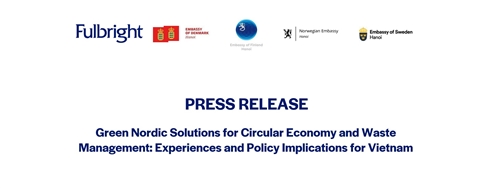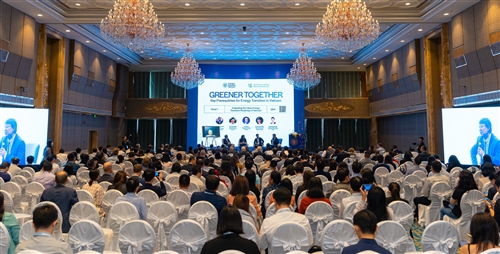350 leading scientists, international government officials, and heads of leading corporations in Vietnam recently join the “Greener Together - Key Prerequisites for Energy Transition in Vietnam” Conference co-hosted by Fulbright University Vietnam and the Maureen and Mike Mansfield Foundation. Aimed at exploring the key prerequisites and strategies to accelerate Vietnam's energy transition towards a more sustainable and greener future, the “Greener Together” conference featured three expert panels to shed light on innovative solutions, policy frameworks, and investment opportunities that are projected to pave the way for Vietnam's successful green transition.
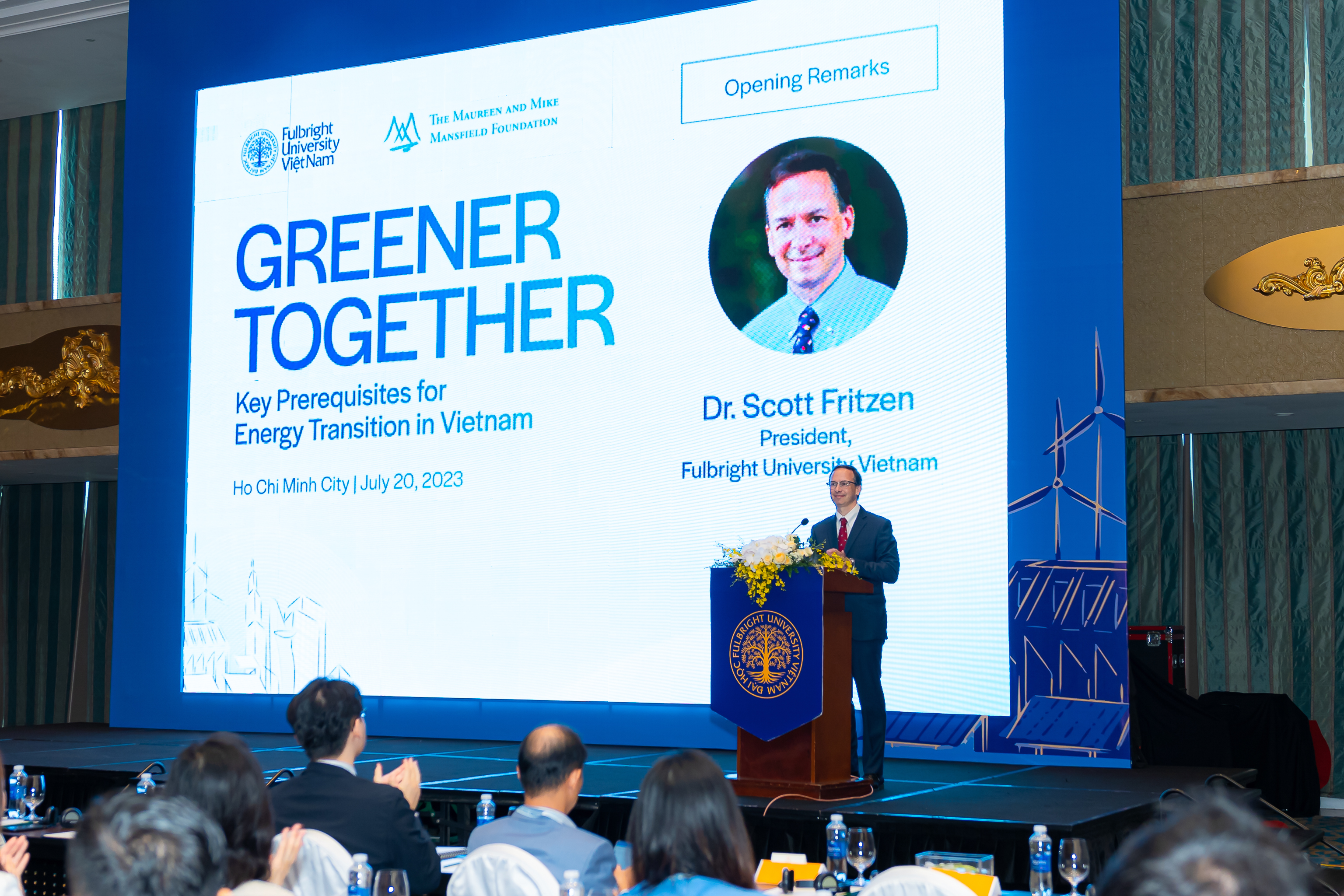
Welcoming Remarks by Dr. Scott Fritzen, President of Fulbright University Vietnam.
The event kicked off with an opening speech by Dr. Scott Fritzen, President of Fulbright University Vietnam, who extended a warm welcome to all attendees. In his speech, Dr. Fritzen stressed the urgency of addressing climate change and praised Vietnam's commitments towards a green energy shift. He highlighted the potential economic and social benefits of green energy investments, saying: “Investing in green energy can stimulate economic growth. In 2022, global investments in renewable energy reached a record high of just under $500 billion, mostly towards solar and wind power. Policies such as feed-in tariffs, tax incentives, and renewable portfolio standards have encouraged private sector investments and fostered the growth of renewable energy industries.” Dr. Fritzen expressed gratitude to partners for bringing the conference to fruition and emphasized Fulbright University Vietnam's mission to foster open dialogues on critical issues as it is through meaningful discussions that the global community may address pressing societal concerns via informed and inclusive decision-making.
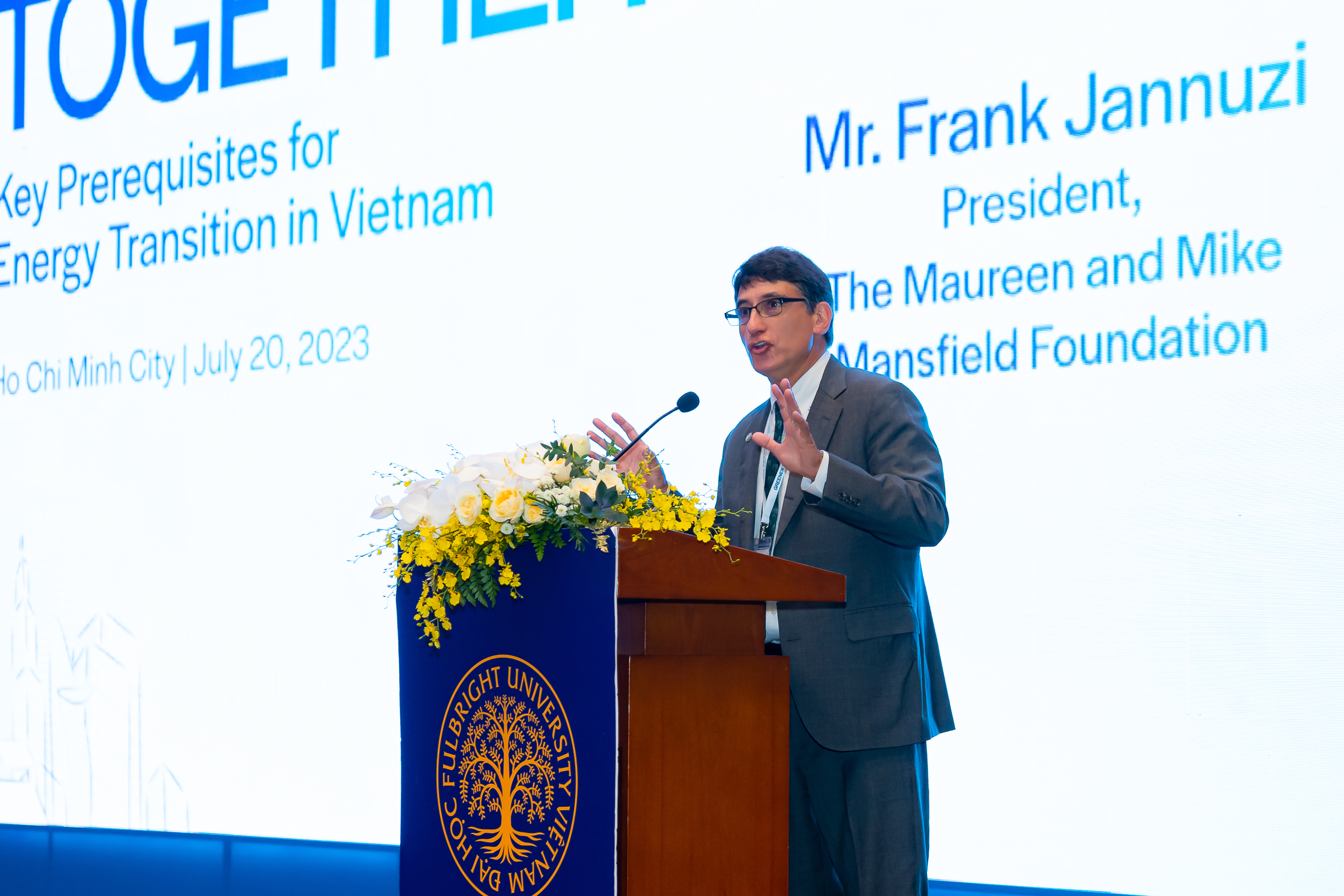
Welcoming Remarks by Mr. Frank Jannuzi, President and CEO of the Maureen and Mike Mansfield Foundation.
Mr. Frank Jannuzi, President and CEO of the Maureen and Mike Mansfield Foundation, continued with the conference's opening remark in which he highlighted the urgency of addressing climate change and the importance of unified action in the Indo-Pacific region. He emphasized the positive contributions and leadership of countries like China, Japan, and the United States in renewable energy investment and efficiency.
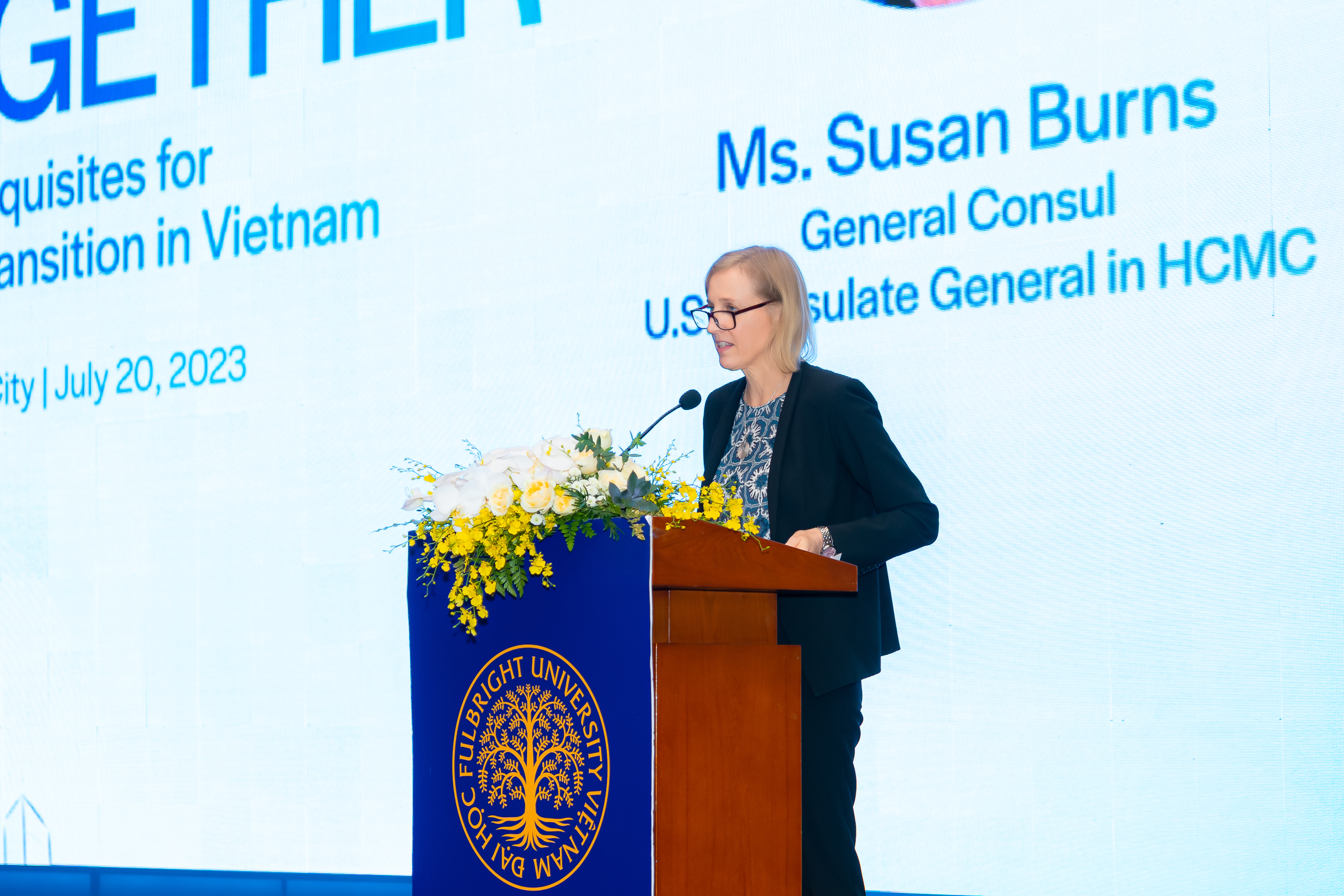
Keynote speech by Ms. Susan Burns, The US Consul General in Ho Chi Minh City.
Following Mr. Jannuzi, The US Consul General Ms. Susan Burns discussed US-Vietnam collaboration for energy transition in her keynote speech. Ms. Burns' key points included Vietnam's climate challenges and opportunities, the United States' role in supporting Vietnam's climate goals, and specific policy recommendations for clean energy transition. Vietnam faces climate vulnerability due to geography and rising energy demand. However, it leads to renewable energy deployment in Southeast Asia with abundant resources. “The country is already a leader in renewable energy deployment in southeast Asia. Solar and wind power account for over a quarter of Vietnam's installed energy capacity. And while it is not all yet connected to the grid, the medium and long-term potential is even greater still. Now that Vietnam has finalized PDP-8, Vietnam faces a crucial opportunity to ensure that the implementation of the plan maximizes the potential for renewable energy and grid modernization to accelerate Vietnam's clean energy transition and achieve both Vietnam's 2050 net-zero target and the targets of JET-P. The United States is deeply committed to working with Vietnam to achieve those goals in a manner that ensures secure, affordable, and sustainable energy access for Vietnam.” The US supports Vietnam through programs like JET-P, V-LEEP II, and VUES. Ms. Burns noted that to accelerate clean energy, Vietnam needs increased wind and solar deployment with clear pricing policies. Strategic investments from public and private sectors are vital to achieve JET-P's target. Cooperation with the US offers exciting opportunities for Vietnam's energy transition and climate goals.
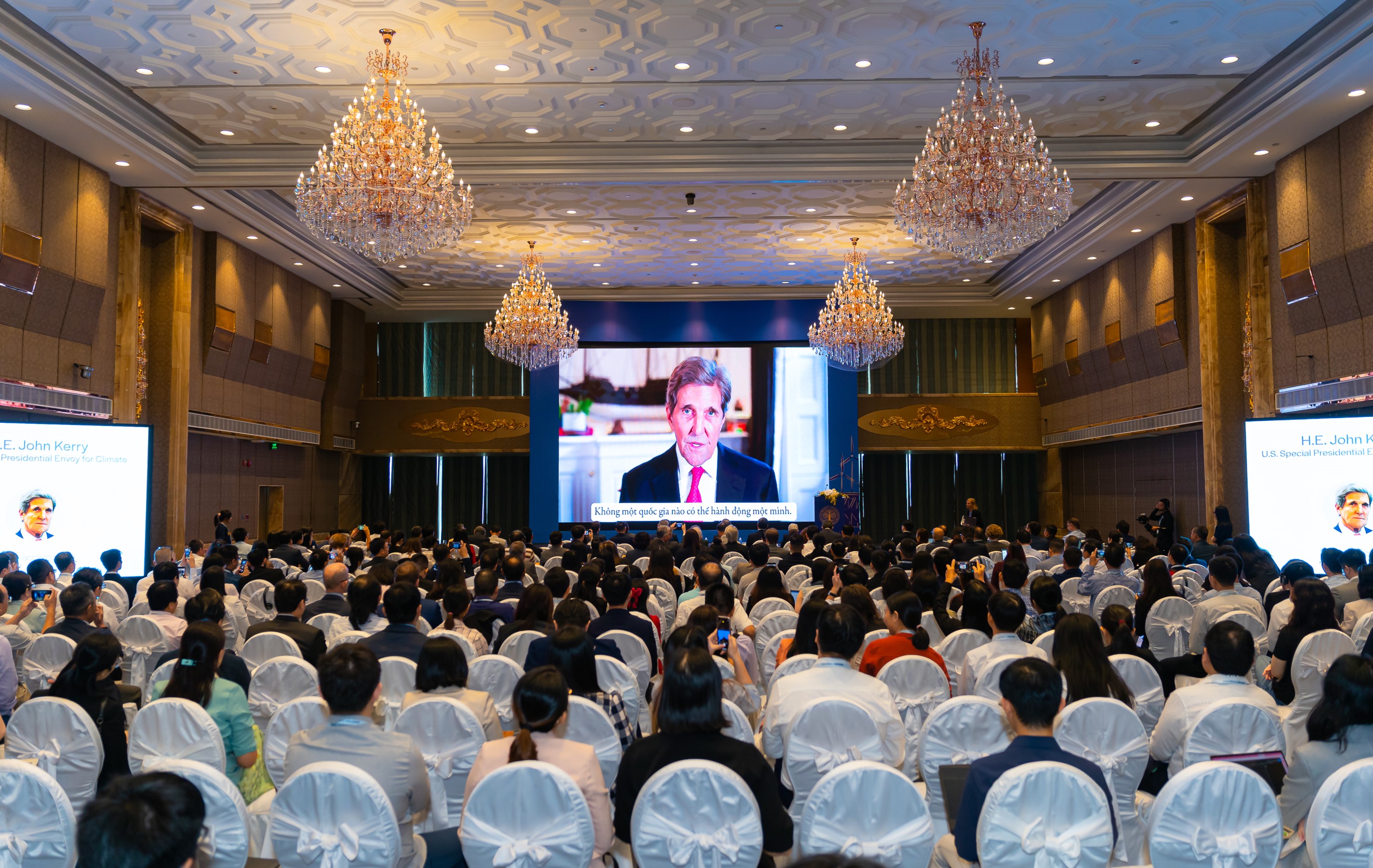
Welcoming Remarks by H.E. John Kerry, U.S. Special Presidential Envoy for Climate.
The conference featured an e-address from H.E. John Kerry, U.S. Special Presidential Envoy for Climate, in which he notes that “the world is in a crisis of its own making,” that “countries and private companies alike [are working] to increase our investment in the clean energy future” and Vietnam is a “linchpin” in helping to bring about a greener future for all.
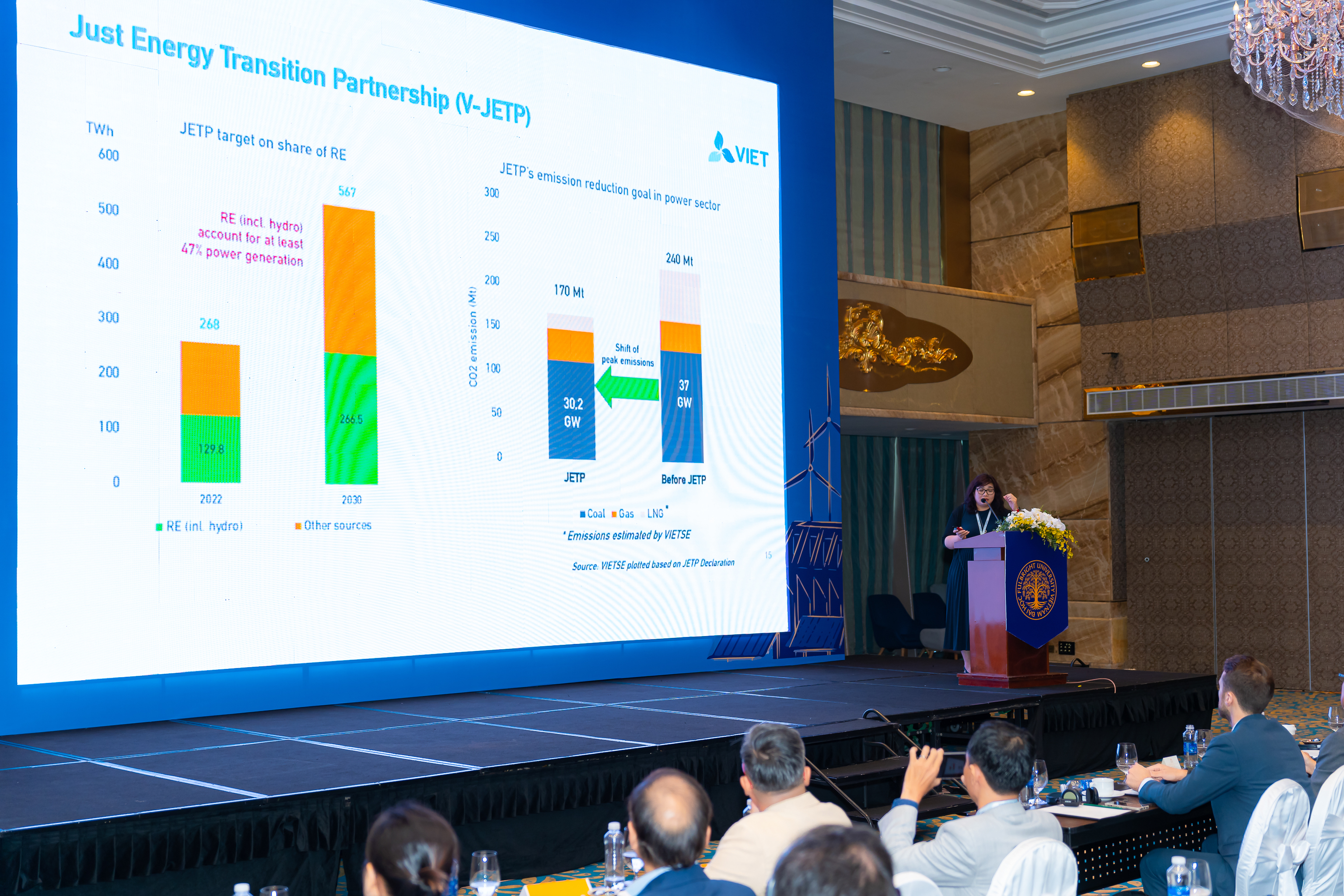
Ms. Ngô Thị Tố Nhiên's presentation on Vietnam's Energy Transition Road Map.
The morning session started with Vietnam Initiative for Energy Transition's Ms. Ngô Thị Tố Nhiên's presentation on Vietnam's Energy Transition Road Map, in which she discussed Vietnam's Power Development Plan VIII (PDP8) and the Joint Energy Transition Plan (JETP), both will play crucial roles in guiding the country's clean energy transition. The roadmaps focus on the technological feasibility of implementing renewable energy sources, ensuring their cost-effectiveness and affordability, and enhancing energy security for the nation. Moreover, grid integration and stability, along with considerations towards the environmental impact of clean energy solutions, are key issues at hand in developing sustainable policies and regulatory frameworks.
This was then followed by 3 panel discussions in the morning and afternoon.
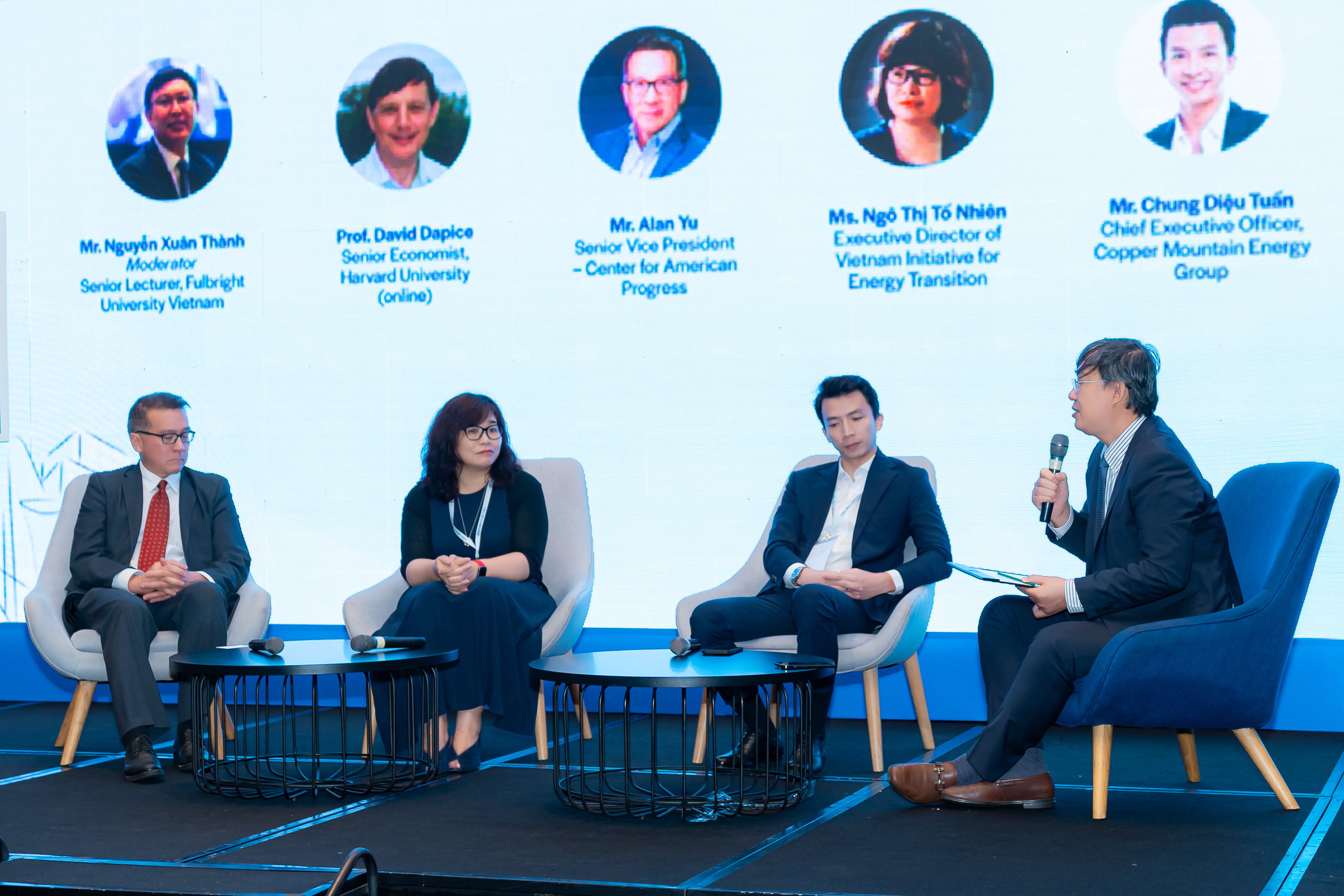
Panel 01: Evaluating Energy Transition Roadmap of Vietnam.
First Panel
Moderator: Mr. Nguyễn Xuân Thành - Senior Lecturer, Fulbright University Vietnam | Economics Advisor to the Prime Minister
- Professor David Dapice, Senior Economist, Harvard University | Professor Emeritus of Economics at Tufts University
- Mr. Alan Yu, Senior Vice President – Center for American Progress | Former Director for Asian Affairs, U.S. Department of Energy
- Ms. Ngô Thị Tố Nhiên – Executive Director of Vietnam Initiative for Energy Transition
- Mr. Chung Diệu Tuấn – Chief Executive Officer, Copper Mountain Energy Group
The first panel assessed the Vietnamese government's achievements in managing, operating, and reforming the energy market. Experts discussed the integration of renewable energy into the infrastructure and the importance of investments in transmission and battery storage to ensure reliable energy supply. In the first presentation, Professor David Dapice stated: “Green energy transition would require a smart grid that can adjust to a variety of demands, which is something Vietnam does not currently have”. He suggested that Vietnam go for an energy combination of different sources to reduce the cost and maximize electricity production efficiency.
Ms To Nhien, based on Professor David's presentation, focused her discussion on hydropower and noted that the transition should be human-centered and needed to adapt to the basis of human needs and convenience. Mr Alan Yu felt that this is an opportunity for Vietnam in an international setting, to seek for technical and other support. He noted that the transition should focus on both policies to be implemented and sustainability taken into consideration. Mr Chung Dieu Tuan, with his expertise in developing green power plants, paid attention to the clean energy production and processing technologies to be utilized.
They examined wind energy's role in the emerging green energy mechanism, along with the potential benefits of adopting a market-oriented approach to accelerate Vietnam's green energy transition, in which international partnerships and tax credits are of vital importance.
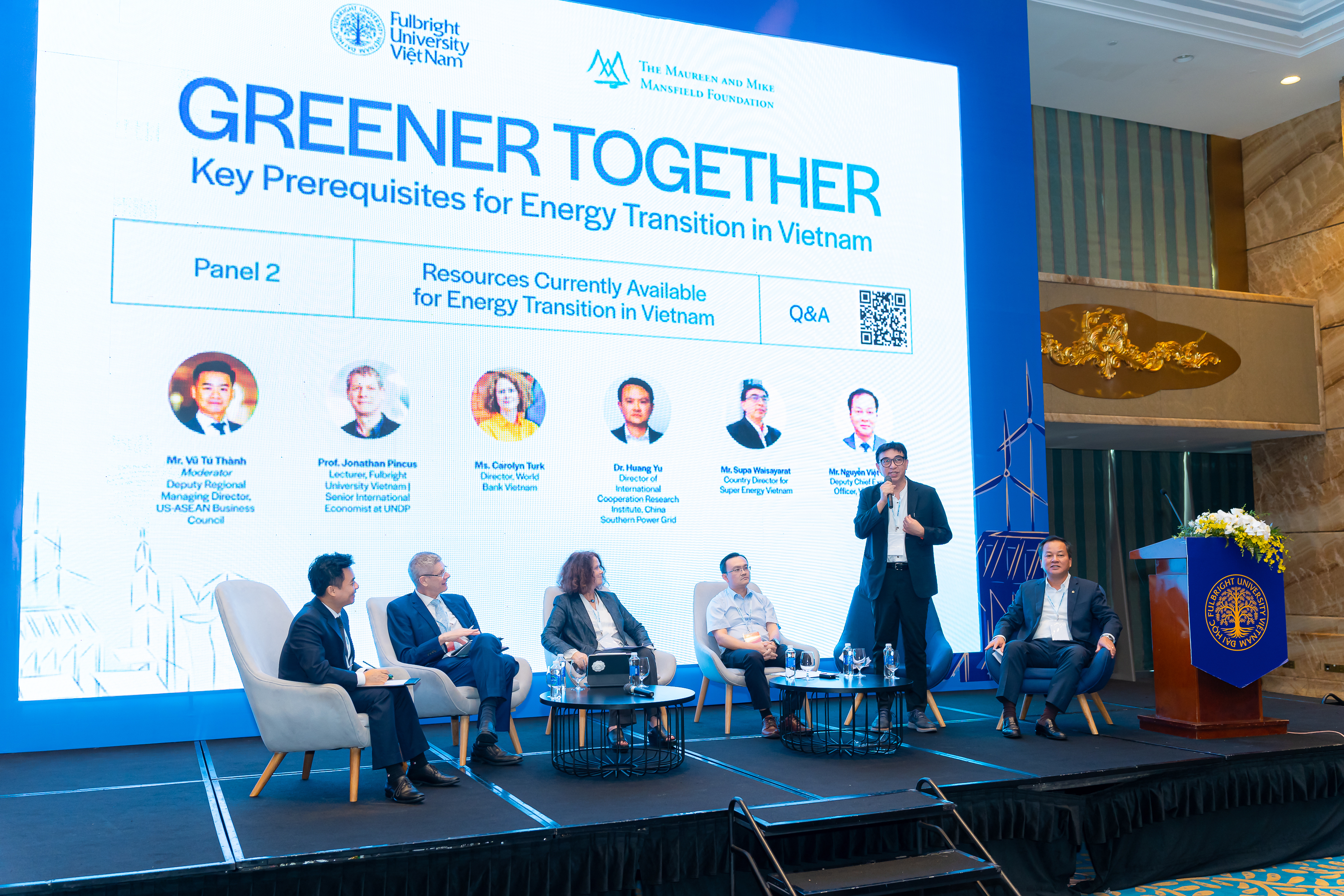
Panel 02: Resources Currently Available for Energy Transition in Vietnam.
Second Panel
Moderator: Mr. Vũ Tú Thành – Deputy Regional Managing Director, US-ASEAN Business Council
- Mr. Nguyễn Việt Cường, Deputy Chief Executive Officer, Vietcombank
- Professor Jonathan Pincus – Lecturer, Fulbright University Vietnam | Senior International Economist
- Ms. Carolyn Turk – Director, World Bank Vietnam
- Dr. Huang Yu – Director of International Cooperation Research Institute, China Southern Power Grid
- Mr. Supa Waisayarat – Country Director for Super Energy Vietnam
In the afternoon, the Greener Together Conference returned with a session on attracting foreign direct investment (FDI) in the energy sector. The panelists explored Vietnam's abundant potential for renewable energy at competitive prices, presenting an opportunity to make the country an attractive FDI destination.
Dr Huang Yu noted: “Vietnam has abundance coal and water resources as well as a long coastline which is extremely conducive to the production of wind power.” He also placed significance on the location of Vietnam, which borders China, Laos, and Cambodia (220 kV power interconnection with these 3 countries) which allowed for the development of a regional energy market as the differences in energy structure with neighboring countries provide opportunities for resources complementation. This should be implemented concurrently with the attraction of an international investment pool for new energy. This is further reinforced by Mr. Supa, who, in his speech, demands the capture and limitation of carbon dioxide.
The panel examined how the public and private sectors could collaborate to construct and operate transmission and battery storage systems, leveraging available financial and technical assistance. Ms. Carolyn Turk, from her stance as a banking director, spoke towards balancing the expenditure plan of the public sector so that the private sector can receive affordable energy to be able to make a profit, i.e., to take into considerations the costs and financial issues amidst the climate change and transition. She believed that the problems presented demand collaboration between the private and public sector, which could be achieved through a procedure framework (for accessible prices and importation of private technology) and transparent auctions.
To add to that, Mr. Nguyen Viet Cuong focused on the connections between banking institutions in order to manage the monetary support. On the topic, Professor Jonathan Pincus concluded that the transition could only be achieved when Vietnam could reverse the trend, have better regional planning and public investment, as he detected a vital connection between the energy sector and the financial sector.
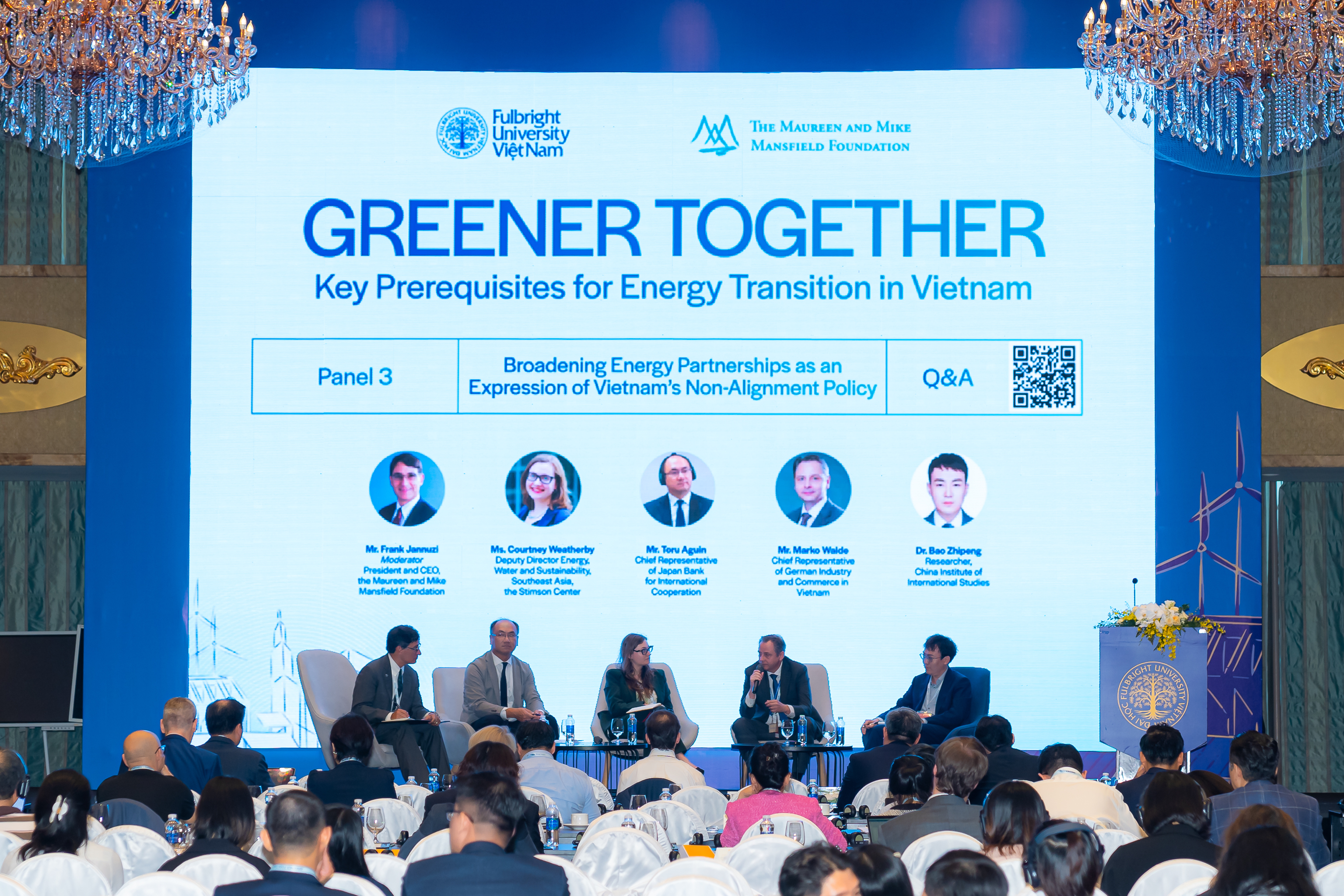
Panel 03: Broadening Energy Partnerships as an Expression of Vietnam's Non-alignment Policy.
Third Panel
Moderator: Mr. Frank Jannuzi – President and CEO, the Maureen and Mike Mansfield Foundation
- Ms. Courtney Weatherby – Deputy Director Energy, Water and Sustainability, Southeast Asia, the Stimson Center
- Mr. Toru Aguin – Chief Representative of Japan Bank for International Cooperation in Vietnam
- Mr. Marko Walde – Chief Representative of German Industry and Commerce in Vietnam.
- Dr. Bao Zhipeng – China Institute of International Studies
The final panel discussion addressed Vietnam's clean energy transition in collaboration with the international community to accelerate its green energy transition.
Ms. Courtney Weatherby of the Stimson Center felt that the transition was both a challenge and an opportunity for Vietnam, as “there were lessons to be learned,” especially from neighboring countries. Per Ms. Weatherby, it was about building and exercising more capacity over the long run. Dr Bao Zhipeng followed this point, emphasizing that it was a high time for Vietnamese international partnerships.
Experts examined the contributions of China, Japan, Europe, and the USA, including supply chain strengthening for renewable energy production and exchanges of capital, technology transfers, and know-how. Ms. Courtney also focused on the creation of strategic planning for energy integration, not only from US-Vietnam partnerships but from every other country as well, and she suggested that Vietnam could adopt Australian technology to store electricity to allow for more electricity trade. Mr. Marko Walde stressed that the transition had to start as soon as possible, as there was global competition for investment towards technology needed to speed up green energy transition.
From his stance, Mr. Toru Aguin reminded audience members of the “Asia Zero Emissions Community” concept, with fundings allocated to Vietnam from JBIC (Japan Bank for International Cooperation) equaling 7 billion USD to promote energy development. He also elaborated on the way Japan could collaborate with Vietnam on "building roadmaps, establishing finance, and deploying decarbonization technologies," in the view of maximizing renewable energy production and establishing standards for energy conservation and management.
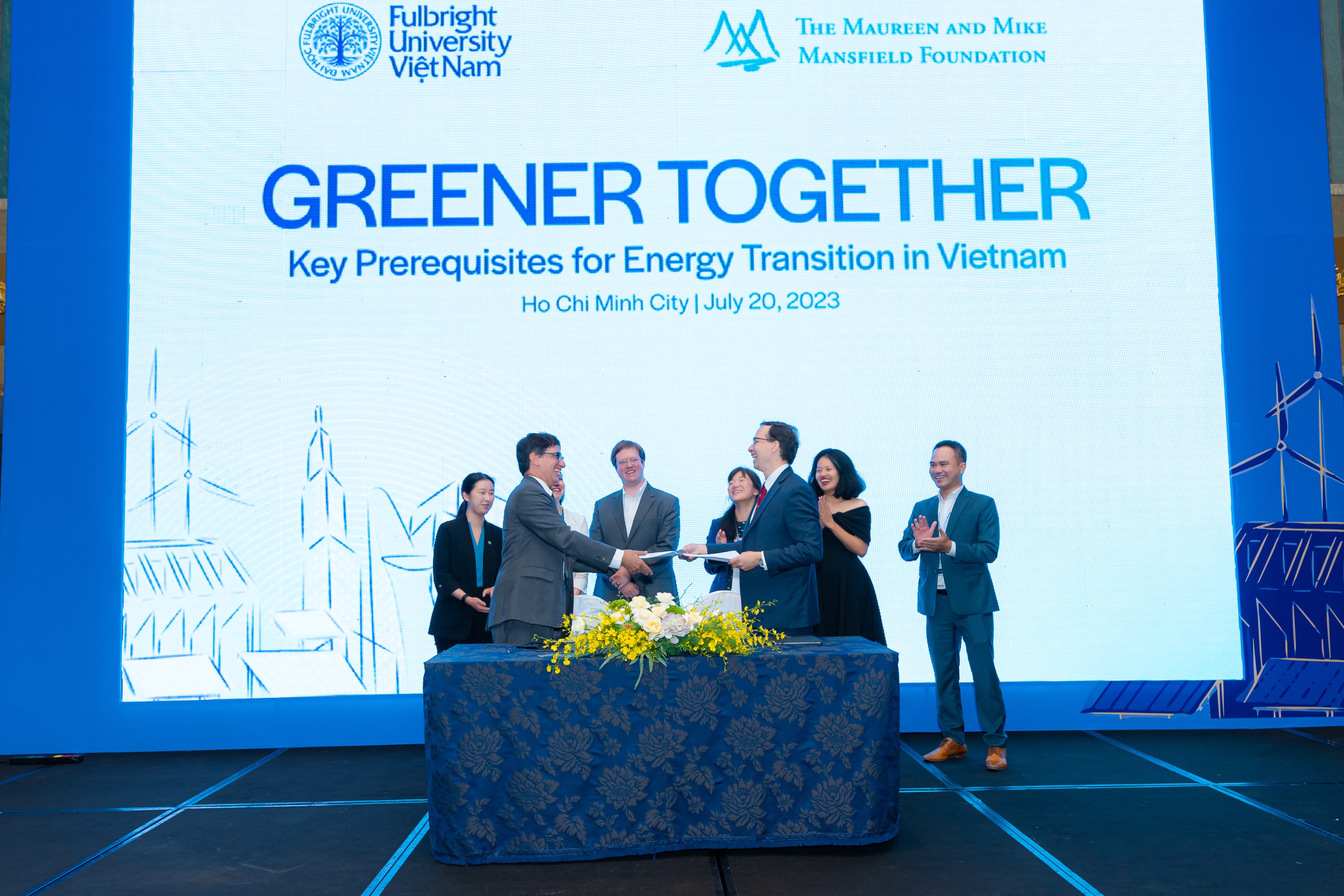
MOU Signing Ceremony between Fulbright University Vietnam and the Maureen and Mike Mansfield Foundation.
Fulbright University Vietnam and the Maureen and Mike Mansfield Foundation are committed to promoting mutual understanding and cooperation between the United States and Vietnam, fostering a more peaceful and harmonious world for future generations.
The “Greener Together - Key Prerequisites for Energy Transition in Vietnam” Conference concluded at 5pm the same day and marked a special milestone in Vietnam's journey towards a more sustainable and environmentally conscious future. The event highlighted the importance of international collaboration, with representatives from various countries coming together to support Vietnam's efforts in combatting climate change. As the conference concluded, a sense of optimism and determination filled the room, knowing that the collective efforts of all participants would play a crucial role in shaping Vietnam's energy landscape and paving the way for a greener, more prosperous tomorrow.
About Fulbright University Vietnam
- Fulbright University Vietnam is committed to providing a world-class education that fosters critical thinking, innovation, and interdisciplinary collaboration. The university strives to create a platform for open and public dialogues on critical issues, contributing to informed and inclusive decision-making processes in Vietnam and beyond.
About the Maureen and Mike Mansfield Foundation
- The Maureen and Mike Mansfield Foundation aims to promote mutual understanding and cooperation between the United States and the nations and peoples of Asia through public education, dialogue, and networking among problem solvers.
Phan Phuoc Thuc Nguyen
Related Articles

Scholarship Info Session & Demo Class in Laos
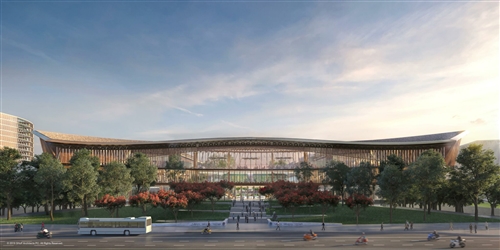
Professor Scott Fritzen Named Second President of Fulbright University Vietnam
